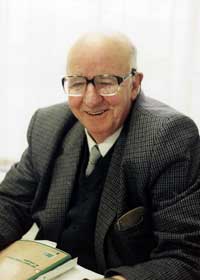9 December 2004 Edition
RTÉ's stab at Joe Cahill
BY Matt Treacy

The late Joe Cahill
While Richard English is by no means the worst contemporary commentator on modern republicanism, I felt that his contributions to the documentary about Joe Cahill (Hidden History, Joe Cahill; IRA Man, RTÉ 1, Tuesday) did not do justice to the reasons why people like Cahill disagreed with the leadership of the Republican Movement in the 1960s.
English claimed that Joe and others had little time for the Civil Rights Movement, whereas Eamonn McCann was more accurate when he described their attitude as being one of regarding the civil rights campaign as being bound to lead to a backlash, because of the nature of the northern state, and that the role of the IRA in that event was to be prepared militarily to resist that and take the initiative.
That is what happened but what we are now seeing is a rerun of the old theory favoured by the Officials that everything would have been grand if People's Democracy hadn't "provoked" the Paisleyites and B-Specials at Burntollet, and if the Provos hadn't undermined their strategy by splitting in 1969.
While the SDLP fly their "Sunningdale for Slow Learners" kite, Ed Moloney and others claim that the movement only came around to Goulding's position 25 years later. Both positions are probably more reflective of the sour grapes of certain people, but are none the less contemptible for all that. The true legacy of middle-class constitutionalism was the 50 years of subservience that followed partition. The true legacy of those who had subverted the movement in the 1960s was the burning houses on Bombay Street.
The film about Joe Cahill gave some flavour of the courage and ingenuity of those who had in short order to re-organise the Irish Republican Army in the midst of an onslaught from the Unionist state and paramilitaries and the collaboration of the 26-County state. One would be perhaps mistaken, however, for gaining the impression that the only people killed by the IRA were civilians, as there was no account of the manner in which the IRA successfully fought the crown forces over a period of more than 25 years.
Republicans were appalled by the instances where innocent civilians were killed as the result of IRA operations. They were also, unlike their enemies — as evidenced at this very moment in Iraq — prepared to acknowledge this and to do their utmost to avoid civilian casualties, even at the cost of making it far more difficult to engage the enemy, which positioned itself as close as possible to, generally unwelcoming, civilian populations.
That moral or ethical aspect to the peace strategy has never really been discussed, least of all by republicans. However, it was and remains an important consideration. Some would argue that is a weakness for a movement engaged in armed struggle but we must always bear in mind that republicans have never waged armed struggle in isolation from or without the support of substantial sections of the population. People like Joe understood that, and that is why he and others were prepared to adapt to new means and new strategies.
Of course, there is no way of knowing whether any strategy will be successful, but as Joe himself said at the last Ard Fheis, the growing political strength of Sinn Féin and the centrality of the movement to politics in this country is proof that republicans and the republican demand for Irish freedom are at the centre of things.
While this film was interesting in many ways, I was left with the feeling that the makers had no real understanding of what Joe Cahill was all about, which is all the more reason why republicans need to be writing our own history.


